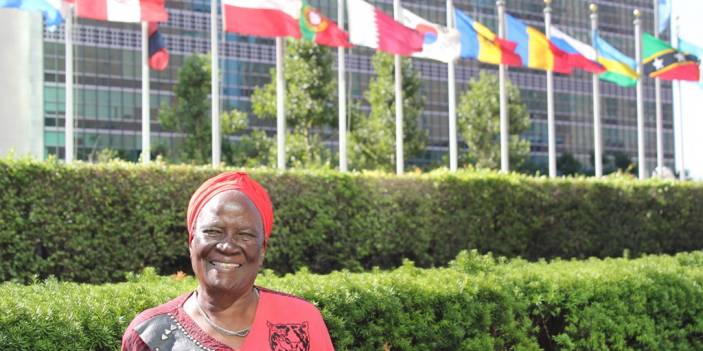This blog is adapted from the above speech delivered by Sylvia Beales to the UN General Assemly on 25 September 2015.
I am here to speak about ageing and older persons.
My name is Sylvia Beales. I am 60 years old. I work with HelpAge International, a global network present in all regions of the world.
Working together with the organisations of the UN Stakeholder Group on Ageing we represent 800 million older women and men worldwide.
We congratulate you on embedding age in the goals and targets. We especially commend your pledge to “leave no one behind”. We look to you to ensure that these promises are kept.
We call on you to “count us in”. Counting in everyone, from birth to death, reaching the furthest first, means embracing all of us, young and old, as partners.
As former archbishop Desmond Tutu said, “I want to tell the world that I count, that older people everywhere count, that people of all ages should be included in the Sustainable Development Goals.”
All of us in this room and beyond are ageing. We all want to age well, in safety and with dignity. We want the same for our children.
It is right that the SDGs take into account ageing and older people. The speed and scale of ageing everywhere must be responded to.
Today, two people reach the age of 60 every second. By 2030, 16% of the world’s population will be over 60. Women over 50 already make up a quarter of the world’s women, almost 47% of over 65s live with disabilities. Those over 60 account for three-quarters of deaths from non-communicable diseases.
Even though ageing is happening fastest in the developing world, basic requirements for living well in later life do not exist. Lack of regular income blights the lives of millions – only one in four have a pension in middle and low-income countries, and loans for business are denied on the basis of age.
Older women are invisible victims of appalling abuse and violence. They experience the dual impact of age and gender discrimination, including less access to education and health services, lower earning capacity, and restricted access to land ownership.
We older people fear, with reason, poor health, illness and poor care. Just two weeks ago, here at the UN, 78-year-old Esther told us about the death of her 75-year-old husband in his wheelchair after being forced to wait for over five hours in a hospital queue to see a doctor. She said this was not unusual, despairing at older people’s invisibility and exclusion.

Ageing is both an opportunity and a challenge. We call on you to:
• Recognise that population ageing is a success, not a burden. It is a triumph of humanity and of development. Celebrate ageing, do not fear it.
• In your national planning, analyse, prepare for, and invest in population ageing and older people.
• Create and finance programmes that address the needs of older persons and protect our human rights. This means ending age discrimination, eradicating poverty in older age, and ensuring decent health care, pensions, opportunities for jobs and life-long learning.
• Integrate us as essential stakeholders in the national, regional and global mechanisms set up to implement the sustainable development framework.
• Invest now and build capacity to fill the gaps on missing data. Poverty data in old age is missing for 93 countries, especially in Africa. Data sets that impose age limits of 49 or 64 years are not fit for purpose. These age limits mean, for instance, that violence against older women goes unrecorded.
Ageism must end now, once and for all.
In the words of former archbishop Desmond Tutu: “As we get older, our rights do not change. As we get older, we are no less human and should not become invisible.”
Explore the data behind ageing in this year’s Global AgeWatch Index.
